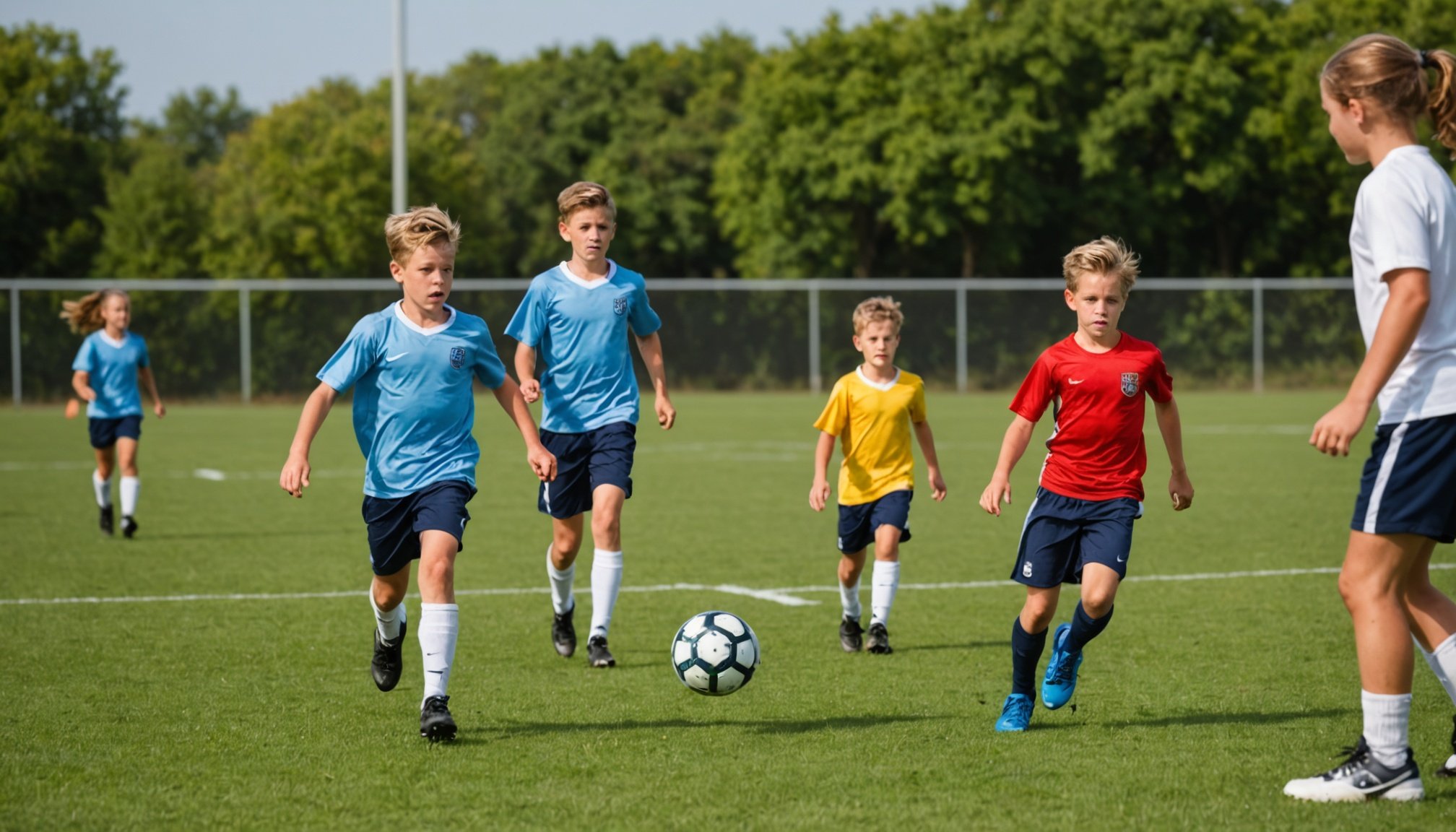In the world of sports, resilience stands as a critical pillar for young athletes striving to reach their highest potential. With increasing competition and high expectations, the ability to bounce back from setbacks and maintain a positive mindset is essential. This article explores effective strategies that coaches can implement to foster resilience in their young athletes, helping them navigate the challenges of training and competition. By focusing on mental toughness and providing the right support, coaches can significantly enhance the performance and overall well-being of their teams.
Understanding Resilience in Sports
Resilience in the context of sports refers to an athlete’s ability to recover from disappointments, injuries, or performance slumps. It is not merely about physical strength; it encompasses a mental and emotional dimension that is crucial for success. Young athletes face numerous challenges, including pressure to perform, fear of failure, and stress from both internal and external sources. Understanding these dynamics is the first step in helping them build resilience.
Also to discover : How does the community support system impact the success of UK athletes?
Coaches play a pivotal role in this developmental process. By creating an environment that encourages open communication and support, they can help young athletes recognize that setbacks are a natural part of their journey. It’s essential to discuss the significance of resilience openly, emphasizing that mental fortitude is as important as physical training.
Additionally, training programs should incorporate mental skills training alongside physical skill development. Techniques such as visualization, goal-setting, and mindfulness can enhance an athlete’s ability to manage stress and maintain focus during high-pressure situations. This holistic approach not only improves performance but also contributes to better health and well-being.
Also to discover : How can schools better integrate physical education into their curricula in the UK?
In conclusion, understanding the fundamentals of resilience equips coaches with the insights needed to foster a supportive atmosphere that nurtures the mental and emotional growth of young athletes.
Building a Supportive Environment
Creating a supportive environment is vital for the development of resilience in young athletes. This support system should extend beyond just the coach; it involves parents, peers, and the entire sports community. Coaches should encourage open lines of communication, allowing athletes to express their thoughts and feelings about their experiences in sports.
Coaches should arrange regular meetings or check-ins with their athletes to discuss any challenges they may be facing. These discussions can help identify potential stressors and develop strategies to overcome them. By reassuring athletes that they are not alone in their struggles, coaches can foster a sense of belonging and community that is essential for resilience.
Moreover, implementing team-building activities can enhance relationships among team members. When young athletes feel connected to their peers, they are more likely to seek support from one another during tough times. This camaraderie not only strengthens bonds but also creates an atmosphere where athletes feel safe to take risks, make mistakes, and learn from them.
Recognizing and celebrating small victories is another effective strategy. Acknowledging progress, no matter how minor, boosts an athlete’s confidence and encourages them to persist through challenges. By highlighting their efforts, coaches reinforce the idea that resilience is about growth and development rather than solely about winning.
A supportive environment cultivates resilience, allowing young athletes to thrive even in the face of adversity.
Teaching Coping Strategies
Equipping young athletes with effective coping strategies is crucial in developing their resilience. These strategies enable them to manage stress and maintain a healthy mindset during both training and competition. Coaches can introduce various techniques that help athletes navigate the emotional ups and downs of sports.
One important coping strategy is mindfulness. Mindfulness involves being present in the moment and accepting thoughts and feelings without judgment. Coaches can incorporate mindfulness exercises into their training sessions, such as guided meditation or breathing exercises. These practices help athletes center themselves, reduce anxiety, and enhance focus, allowing them to perform at their best under pressure.
Another valuable tool is visualization. Athletes can benefit from visualizing successful performances, which helps build confidence and solidifies their goals. Coaches can facilitate visualization sessions, guiding athletes to imagine themselves executing skills flawlessly or overcoming obstacles. This mental rehearsal prepares them for real-life scenarios they may encounter in competitions.
Goal-setting is also a powerful strategy. By setting realistic and achievable goals, athletes can maintain motivation and track their progress. Coaches should encourage athletes to set both short-term and long-term goals, focusing on incremental improvements rather than just winning. This approach cultivates a growth mindset, emphasizing the importance of effort and perseverance in the face of challenges.
Teaching these coping strategies empowers young athletes to handle stress effectively, fostering resilience that will benefit them throughout their sports careers and beyond.
Encouraging Positive Self-Talk
Positive self-talk is a fundamental aspect of developing resilience in young athletes. The way athletes speak to themselves can significantly impact their confidence and performance. Coaches can play a vital role in teaching athletes to cultivate a positive internal dialogue that supports their growth and resilience.
To begin, coaches should model positive self-talk during training sessions. By demonstrating how to reframe negative thoughts into constructive ones, coaches provide practical examples for athletes to follow. For instance, instead of saying, “I can’t do this,” athletes can learn to say, “I will give my best effort and learn from this experience.” This shift in language fosters a more optimistic outlook, which is crucial for resilience.
Additionally, coaches can encourage athletes to create personal affirmations—positive statements that reinforce their self-belief and capabilities. Athletes can repeat these affirmations during practice, before competitions, or whenever they feel self-doubt creeping in. This practice reinforces their self-worth and encourages a resilient mindset.
Moreover, promoting a culture of positivity within the team can significantly enhance an athlete’s self-talk. Coaches should encourage athletes to support and uplift each other, celebrating their achievements and acknowledging challenges together. When athletes feel supported by their teammates, they are more likely to develop a resilient mindset that helps them navigate tough situations.
By encouraging positive self-talk, coaches contribute to the development of young athletes’ mental fortitude, enabling them to face challenges head-on and maintain a strong belief in their abilities.
Instilling a Growth Mindset
Instilling a growth mindset is essential for developing resilience in young athletes. This psychological concept, popularized by psychologist Carol Dweck, suggests that individuals who believe their abilities can be developed through dedication and hard work are more likely to persevere through challenges. Coaches have the unique opportunity to cultivate this mindset within their teams.
To promote a growth mindset, coaches should emphasize the importance of learning from mistakes rather than fearing them. Instead of pointing out failures as negative outcomes, coaches can frame them as valuable learning opportunities. By discussing what went wrong and how to improve, coaches help athletes understand that setbacks are not a reflection of their worth or potential.
Setting an example of resilience themselves can also inspire athletes. Coaches should share their own experiences with failure and how they overcame obstacles to achieve their goals. This transparency shows young athletes that resilience is a skill that can be developed, and it motivates them to adopt a similar approach.
Additionally, coaches should encourage athletes to take on new challenges, even if they feel uncertain about their abilities. By stepping out of their comfort zones and attempting new skills or positions, athletes learn to embrace discomfort and build their confidence over time. Celebrating efforts rather than just outcomes reinforces the idea that progress is a continuous journey.
In conclusion, fostering a growth mindset among young athletes equips them with the resilience needed to overcome challenges in sports and life. Coaches play a crucial role in guiding this process, helping athletes understand that their potential is not fixed but can be continually developed through hard work and perseverance.
In the realm of sports, developing resilience in young athletes is not just about enhancing their performance; it is about nurturing their overall mental and emotional well-being. By implementing strategies such as creating a supportive environment, teaching coping methods, encouraging positive self-talk, and instilling a growth mindset, coaches can significantly impact their athletes’ lives.
Resilience is a crucial attribute that helps young athletes tackle the various challenges they encounter in training and competition. As they learn to overcome obstacles and setbacks, they not only improve their performance but also develop essential life skills that will serve them well beyond the sports field. Coaches, by taking proactive steps to foster resilience, contribute to shaping not only successful athletes but also confident and resilient individuals.











